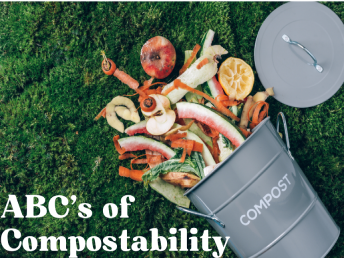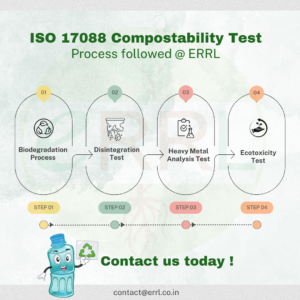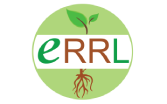
Introduction :
Compostability plays a vital role in sustainable waste management, offering a pathway to transform organic materials into valuable resources. In this blog, we will delve into the fundamentals of compostability and how ERRL Lab tests materials to determine their suitability for composting. Join us as we explore the importance of compostability in reducing waste and promoting circularity in our ecosystems.
What is Compostability ?
Compostability refers to the ability of a material to break down into compost, a nutrient-rich soil amendment, through natural biological processes. It involves the conversion of organic matter, such as food scraps, yard waste, and biodegradable products, into humus—a dark, crumbly substance that enriches the soil.
The Benefits of Composting :
Composting offers several key benefits, including:
- Waste Reduction : By diverting organic waste from landfills, composting reduces the amount of waste that generates harmful greenhouse gases like methane. It helps minimize the environmental impact of waste disposal.
- Soil Enrichment : Compost acts as a natural fertilizer, improving soil structure, water retention, and nutrient availability. It enhances plant growth, reduces the need for synthetic fertilizers, and promotes healthier ecosystems.
- Carbon Sequestration : Composting plays a role in carbon sequestration by storing carbon in the soil. This helps mitigate climate change by reducing the amount of carbon dioxide in the atmosphere.
Testing Compostability at ERRL Lab :
 ERRL Lab conducts rigorous testing to evaluate the compostability of materials by ISO 17088 and ASTM D6400 standards. Our testing process involves:
ERRL Lab conducts rigorous testing to evaluate the compostability of materials by ISO 17088 and ASTM D6400 standards. Our testing process involves:
- Biodegradability Assessment : We analyze the material’s ability to break down into smaller components through microbial action. This process is crucial for the material’s eventual conversion into compost.
- Disintegration Evaluation : We assess how well the material breaks down physically during composting, ensuring that it does not leave behind visible or persistent fragments that could contaminate the final compost.
- Heavy Metal Analysis : We need to check if left over material is toxic or harmful for the environment that it will be released in.
- Ecotoxicity Analysis : We examine the potential impacts of the material or its breakdown products on plants, animals, and microorganisms in the composting environment. It ensures that the composting process remains safe and environmentally friendly.
Promoting Circularity :
Compostability aligns with the principles of the circular economy, emphasizing the importance of resource efficiency and minimizing waste. By composting organic materials, we close the loop and reintegrate them back into the natural cycle, reducing the need for virgin resources and supporting a sustainable system.
Taking Action :
As individuals, there are several ways we can contribute to compostability and promote circularity:
- Separate and Compost : Set up a home composting system or participate in community composting programs to divert organic waste from landfills.
- Choose Compostable Products : Opt for compostable alternatives, such as food containers, utensils, and packaging, that have undergone proper compostability testing.
- Educate and Raise Awareness : Spread the word about the benefits of compostability and the importance of reducing waste. Encourage others to adopt composting practices and make informed choices regarding compostable products.
Conclusion :
Compostability is a fundamental aspect of sustainable waste management, offering numerous environmental benefits. Through the testing services provided by ERRL Lab, we can identify materials that are suitable for composting, thus reducing waste and promoting circularity. Let’s work together to embrace compostability, reduce our environmental footprint, and create a greener future for generations to come.
Remember, by composting, we not only enrich the soil but also nurture a more sustainable and resilient ecosystem. Join us in embracing the ABCs of compostability and be a part of the circular economy revolution.
#ERRLLab #Compostability101 #CircularEconomy
External Article Links :
- https://europepmc.org/article/MED/35406232....
- https://pubs.acs.org/doi/10.1021/es504258u
- https://link.springer.com/article/10.1007/s10532-023-10038-1
- https://www.omicsonline.org/open-access/effectiveness-of-single-and-microbial-consortium-of-locally-isolated-beneficial-microorganisms-libem-in-bioaugmentation-of-oil-slu-2155-6199-1000430-100184.html
- https://www.omicsonline.org/open-access/industrial-wastewater-treatment-using-phycoremediation-technologies-and-coproduction-of-valueadded-products-2155-6199-1000428-98392.html
- https://www.omicsonline.org/open-access/biodegradation-of-polythenes-by-bacteria-isolated-from-soil-.pdf
- https://www.ncbi.nlm.nih.gov/pmc/articles/PMC2873018/
- https://pubs.acs.org/doi/10.1021/acs.est.5b03333
